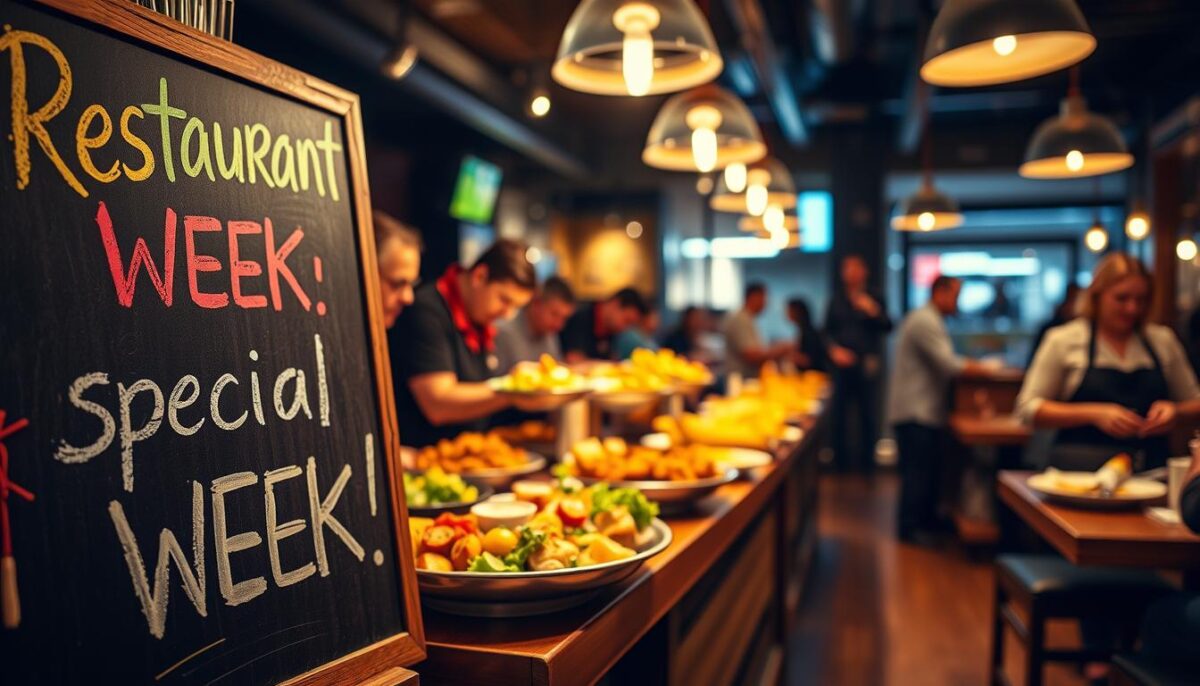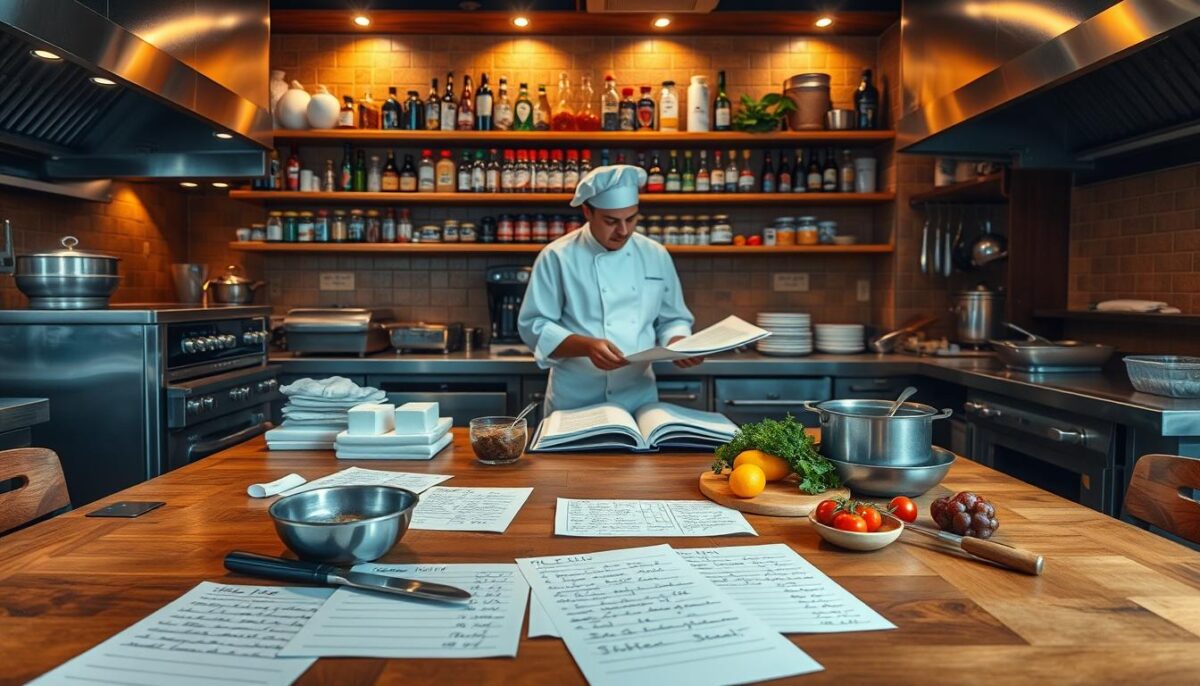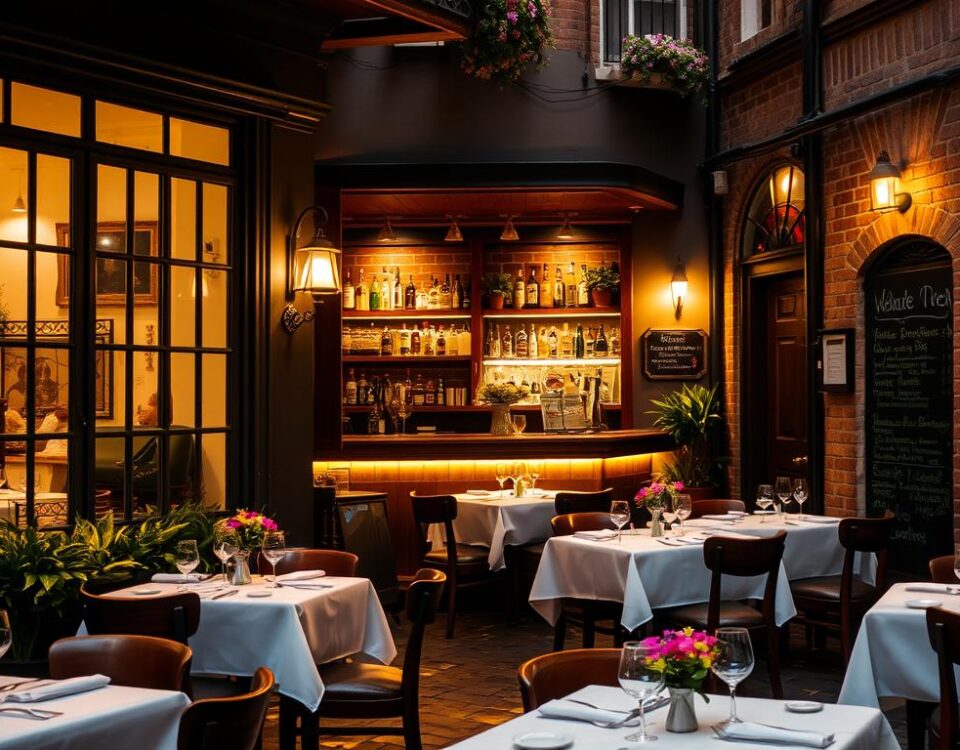
The Pros and Cons of Buying Used Restaurant Equipment Locally
July 22, 2025
Ultimate Restaurant Marketing Guide for the 2026 Season
July 23, 2025Imagine being able to attract new customers, increase visibility, and boost revenue all at once. For many local restaurants, participating in Restaurant Week has been a turning point. This annual event has evolved into a powerful marketing opportunity that transforms how restaurants connect with their communities.
Did you know that during Restaurant Week, participating eateries can experience a significant surge in sales and customer engagement? In fact, many restaurants report a substantial increase in new customers, which is crucial in today’s competitive dining landscape. By joining Restaurant Week, local restaurants can leverage collective marketing power and showcase their unique offerings.
As the dining scene continues to evolve, Restaurant Week remains a vital strategy for restaurants to stand out and thrive. So, what makes this event so impactful for local restaurants?
Key Takeaways
- Participating in Restaurant Week can significantly increase a restaurant’s visibility.
- It’s an opportunity to attract new customers and boost revenue.
- Restaurant Week allows restaurants to showcase their unique offerings.
- The event leverages collective marketing power for participating restaurants.
- It’s a strategic opportunity for restaurants to transform their business.
The Origins and Evolution of Restaurant Week
In 1992, Tim Zagat and Joe Baum revolutionized the dining scene by launching Restaurant Week in New York City. This promotional event was initially a lunch-only affair, scheduled to coincide with the Democratic National Convention, aiming to attract visitors, reporters, and politicians to local restaurants.
The first Restaurant Week was a huge success, and it has since spread to cities large and small across the country. As it evolved, Restaurant Week transformed from a single week to events that now often span two weeks to a month, with many cities hosting multiple events per year.
From NYC to Nationwide Phenomenon
What began as a local promotion in New York City has grown into a nationwide phenomenon. Restaurant Week is now embraced by cities of all sizes, offering a unique dining experience that attracts both locals and tourists.
How Restaurant Week Works Today
Today, Restaurant Week typically takes place during slower seasons, such as early winter or spring. Local chambers of commerce or tourism boards often play a significant role in organizing the event. Participating restaurants offer prix fixe menus, which have become the standard offering during Restaurant Week events across the country.
| Year | Event | Location |
|---|---|---|
| 1992 | First Restaurant Week | New York City |
| Present Day | Multiple Restaurant Weeks | Various Cities |
Boosting Visibility in a Competitive Market
In the competitive world of dining, Restaurant Week provides a platform for restaurants to increase their visibility and reach a broader audience. By participating in Restaurant Week, restaurants can tap into a collective marketing effort that individual establishments might not achieve on their own.
Leveraging Collective Marketing Power
Restaurant Week creates a powerful marketing platform through collective promotion. Participating restaurants benefit from extensive marketing campaigns, including brochures, newsletters, websites, and social media coverage. To maximize visibility, restaurants should create shareable content featuring their menu items and use event hashtags.
Reaching New Demographic Segments
The event’s structure helps break down barriers for diners to try new restaurants, particularly those perceived as too expensive or not aligned with their usual preferences. By leveraging Restaurant Week, restaurants can reach new demographic segments and strengthen their brand identity.
| Marketing Channel | Benefit | Restaurant Week Strategy |
|---|---|---|
| Social Media | Increased Visibility | Use event hashtags and tag Restaurant Week accounts |
| Newsletters | Targeted Promotion | Feature special menu items and promotions |
| Brochures | Physical Presence | Highlight unique dining experiences |

Attracting First-Time Customers to Your Establishment
The reduced pricing model of Restaurant Week is a game-changer for attracting customers who are hesitant to try new restaurants due to price concerns. By offering a prix fixe menu, restaurants can provide a unique dining experience that is both affordable and showcases their culinary expertise.
During Restaurant Week, the focus should be on creating an exceptional experience for first-time diners. This involves not just the quality of food but also the service and ambiance. Ensuring that every customer leaves with a positive impression is crucial for turning one-time diners into repeat customers.
Breaking Down Price Barriers
The prix fixe menu is a key element in making high-end dining more accessible. By offering a full-course meal at a fixed price, restaurants can attract customers who might otherwise be deterred by the usual prices. This approach allows diners to experience the restaurant’s culinary capabilities without the sticker shock.
| Menu Type | Price Range | Customer Appeal |
|---|---|---|
| Prix Fixe | $30-$50 | High |
| À la Carte | $50-$100+ | Moderate |
Creating Memorable First Impressions
To turn first-time diners into loyal customers, it’s essential to create a memorable experience. This can be achieved through a combination of excellent service, quality food, and a welcoming ambiance. As noted by hospitality expert,
“The key to retaining customers lies in the details – from the greeting at the door to the farewell at the end of the meal.”
Collecting contact information from first-time customers during Restaurant Week can also be a valuable strategy for future marketing efforts. By doing so, restaurants can stay in touch with these customers and encourage them to return.
Key Restaurant Week Benefits for Revenue Growth
Restaurant Week offers a multitude of benefits that can lead to substantial revenue increases for restaurants. By participating in this event, restaurants can capitalize on the collective marketing power and attract new customers.
During Restaurant Week, restaurants can experience a significant surge in sales due to the increased foot traffic and customer interest. This event is particularly beneficial as it often takes place during slower periods, such as early winter or spring.
Increasing Table Turnover During Slow Seasons
Restaurant Week typically occurs during early winter or spring, periods that are usually slower for restaurants. By hosting special menus and promotions, restaurants can increase table turnover during these slow seasons, thus maintaining financial stability throughout the year.
Strategic Pricing for Profitability
The success of Restaurant Week also depends on strategic pricing. Restaurants must balance the need to offer value to customers with the need to ensure profitability. By pricing menus appropriately, restaurants can offset lower per-plate prices with increased volume, ultimately boosting revenue during the week and beyond.
Menu Planning Strategies That Showcase Your Best
To stand out during Restaurant Week, it’s vital to strike the right balance between creativity and cost control on your menu. A well-designed menu not only reflects your restaurant’s identity but also appeals to new customers who may be unfamiliar with your cuisine.

One of the biggest gripes about Restaurant Week is that the menus can lack inspiration. To avoid this, decide how you want to present your restaurant to the public and create a menu that reflects that vision. If you want to be known for creativity, allow your back-of-house staff to take some ownership of the menu and cook food that’s interesting to them, as long as it meets your food cost controls.
Balancing Creativity with Cost Control
Balancing creativity with cost control is crucial. You can achieve this by selecting ingredients that are both cost-effective and of high quality. Portion control is another key aspect; it ensures that you’re providing value to your customers without sacrificing profitability.
Highlighting Signature Dishes and High-Margin Items
Highlighting your signature dishes and high-margin items on your Restaurant Week menu can significantly boost profitability. Consider offering a “greatest hits” version of your menu, featuring your best-loved menu items. This approach not only showcases your restaurant’s strengths but also helps in maintaining cost control.
| Menu Item | Food Cost | Menu Price | Profit Margin |
|---|---|---|---|
| Signature Dish 1 | $6 | $20 | 70% |
| Signature Dish 2 | $8 | $25 | 68% |
| High-Margin Item | $4 | $18 | 78% |
By carefully planning your menu and pricing strategy, you can create a compelling offer that attracts new customers and drives revenue during Restaurant Week.
Converting One-Time Diners into Loyal Customers
With Restaurant Week, restaurants have a unique opportunity to not only attract new diners but to make them come back for more. According to Toast.com, a significant 80% of diners who try a restaurant during Restaurant Week are likely to return, debunking the myth that these customers are only looking for one-time discounts.
Effective Post-Event Strategies
Capturing contact information from Restaurant Week diners is crucial for follow-up marketing. Restaurants can use this data to send personalized offers and updates about new menu items or events. For instance, a simple “thank you” email with a discount code for their next visit can go a long way in making customers feel valued.
Loyalty Programs and Return Incentives
Introducing loyalty programs during Restaurant Week can be a great way to convert one-time diners into regular customers. By offering rewards or exclusive benefits, restaurants can incentivize repeat visits. For example, a loyalty program that offers a free dish after a certain number of visits can be very effective.
| Strategy | Description | Potential Impact |
|---|---|---|
| Post-Event Email Campaigns | Send personalized emails with offers and updates | Increase repeat visits by 20% |
| Loyalty Programs | Introduce rewards for repeat customers | Boost customer loyalty by 30% |
“The key to success lies in making every customer feel like a VIP, not just those who come during Restaurant Week.”

Strengthening Community Connections
Restaurant Week offers a unique opportunity for restaurants to strengthen their bonds with the local community. By participating in this event, restaurants can foster deeper connections with their customers and the broader community.
Local Partnerships
One way to achieve this is by partnering with local suppliers, farmers, and food producers. This not only showcases local ingredients but also supports the broader food community. For instance, a restaurant can feature a special dish made with locally sourced produce, highlighting the community’s culinary talent.
Charitable Initiatives
Another significant aspect is the growing trend of incorporating charitable components into Restaurant Week events. By following the model pioneered by Aline Reitzer in Richmond, restaurants can designate a local charity as the beneficiary of the event. This not only gives back to the community but also enhances the restaurant’s reputation as a caring member of the community.
These community partnerships and charitable initiatives can create compelling stories that enhance marketing efforts and customer engagement. By emphasizing their commitment to the local community, restaurants can position themselves as vital, contributing members of their local areas year-round.
Preparing Your Team for Restaurant Week Success
Preparing your restaurant team for Restaurant Week is essential to capitalize on the event’s benefits and provide an exceptional dining experience. A well-trained and motivated staff can make all the difference in handling the increased volume of customers while maintaining high service standards.
Staff Training and Motivation
To ensure a smooth operation during Restaurant Week, it’s crucial to train your front-of-house staff to handle the higher volume of diners. This includes preparing your hosts and servers to exceed guest expectations. Motivating your staff by highlighting the potential for increased tips and future business can also help in maintaining their morale during this busy period.
- Train staff on streamlined service procedures to maintain efficiency.
- Motivate staff by emphasizing the benefits of a successful Restaurant Week.
Operational Efficiency During High Volume
To manage the high volume of customers during Restaurant Week, it’s essential to optimize your restaurant’s operational efficiency. This can be achieved by streamlining menus and service procedures. Preparing your kitchen staff for the different pace and requirements of Restaurant Week service is also vital.
- Streamline menus to reduce complexity in the kitchen.
- Implement efficient service procedures to minimize delays.
By focusing on staff training, motivation, and operational efficiency, you can ensure that your restaurant is well-prepared for the challenges and opportunities presented by Restaurant Week. Clear communication channels and pre-service meetings will also help in aligning your team and ensuring a successful event.
Leveraging Technology to Enhance the Restaurant Week Experience
To maximize the benefits of Restaurant Week, restaurants can utilize modern technology to streamline operations and improve customer engagement. By adopting the right technological tools, restaurants can enhance the overall dining experience, increase efficiency, and drive sales.
Reservation Systems and Online Ordering
A robust reservation system is crucial for managing the increased demand during Restaurant Week. Implementing a table reservation system with an order-ahead feature allows diners to secure their spot and pre-select their meals, improving efficiency and reducing wait times. Additionally, integrating an online ordering system can expand a restaurant’s reach and increase sales by making Restaurant Week offers available to a broader audience.
| Technology | Benefits |
|---|---|
| Reservation System | Manages increased demand, reduces wait times |
| Order-Ahead Feature | Improves efficiency, enhances customer experience |
| Online Ordering System | Increases sales, expands customer reach |
Social Media Strategies for Maximum Impact
Effective social media strategies can significantly amplify a restaurant’s Restaurant Week presence. By creating engaging content, utilizing relevant hashtags, and running targeted promotions, restaurants can attract new customers and build buzz around their Restaurant Week offerings. Leveraging social media trends and encouraging customer interaction can further enhance a restaurant’s visibility and appeal.
Conclusion: Making Restaurant Week Work for Your Business
By leveraging the momentum of Restaurant Week, local restaurants can experience a significant surge in visibility, customer engagement, and ultimately, revenue growth. This event offers a unique opportunity for participating restaurants to shine in a competitive dining landscape.
To maximize the benefits of Restaurant Week, it’s crucial to approach it strategically. This includes careful menu planning, thorough staff preparation, and effective marketing to attract new customers and retain existing ones. By doing so, restaurants can convert one-time diners into loyal patrons and strengthen their connection with the local community.
The collective marketing power of Restaurant Week gives participating restaurants a chance to excel in ways they couldn’t achieve individually. By viewing Restaurant Week as an investment in their future rather than just a short-term sales boost, restaurants can reap long-term benefits that extend far beyond the event itself.
For restaurants considering participation in their local Restaurant Week events, the next step is to start planning. Review your menu options, train your staff, and develop a marketing strategy that highlights your restaurant’s unique offerings. With careful preparation and a strategic approach, Restaurant Week can be a truly game-changing opportunity for your business.
FAQ
What is the purpose of Restaurant Week in New York City?
The purpose of Restaurant Week is to promote local restaurants by offering a prix fixe menu at a discounted price, attracting new customers and increasing visibility for participating establishments.
How do restaurants benefit from participating in Restaurant Week?
By participating in Restaurant Week, restaurants can boost their visibility, attract first-time customers, and increase revenue through strategic pricing and menu planning.
What are some key considerations when planning a menu for Restaurant Week?
When planning a menu for Restaurant Week, it’s essential to balance creativity with cost control and highlight signature dishes and high-margin items to maximize profitability.
How can restaurants convert one-time diners into loyal customers during Restaurant Week?
Restaurants can convert one-time diners into loyal customers by implementing post-event marketing tactics, such as loyalty programs and return incentives, to encourage repeat business.
What role does social media play in the success of Restaurant Week?
Social media plays a crucial role in promoting Restaurant Week and participating restaurants, allowing them to reach a wider audience and create buzz around their prix fixe menu offerings.
How can restaurants prepare their staff for Restaurant Week?
To prepare their staff for Restaurant Week, restaurants should focus on staff training and motivation, ensuring that their team is equipped to provide excellent service during the high-volume event.
What are some ways restaurants can leverage technology to enhance the Restaurant Week experience?
Restaurants can leverage technology by implementing reservation systems and online ordering systems, making it easier for customers to dine with them during Restaurant Week.



